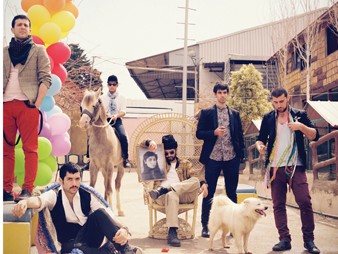Mashrou’ Leila fascinate the crowd with their spellbinding music and they hit the nerve with their outstanding lyrics. They always remain true to their sounds each time and they are elevated to a higher step in their musical career.
Carl Gerges, Omaya Malaeb, Andre Chedid, Haig Papazian, Firas Abou Fakher, Hamed Sinno, and Ibrahim Badr were all students of architecture and design at The American University of Beirut, who formed Mashrou’ Leila overnight as part of a music workshop. A couple of years later, their underground sound shot to fame throughout the whole Arab region!
“Mainstream Arabic music has been dealing with the same topics for a long time, and the longer they have been sung about, the more disillusioned from reality they have become.”
Your music relates a lot to Arab youth by discussing their ups and downs. How do you come up with these lyrics?
When we started making music, we had no idea or interest in recording and making our music ‘public’. So, we wrote what we felt like writing about which were mainly problems and situations we were going through. We think that the power of the spoken word in music should not be taken lightly. Songs are used to spearhead movements and revolutions, to spur troops into war, and also to connect to religious or spiritual beliefs. I think that the lyrics play a big role in Mashrou’ Leila’s music. We have never written with the intention of shocking or stirring controversy.
The commercial Arab music scene dominates the music market in the whole Arab world, as a young band, how does that affect you?
Mainstream Arabic music has been dealing with the same topics for a long time, and the longer they have been sung about, the more disillusioned from reality they have become. I think that’s one of the reasons for the popularity of western music in the Arab world. They deal with more personal and identifiable things. The issue of western music in the Arab world is a long and complicated one but I am just using it here to illustrate a point. I guess we see this as opportunity in writing music that is more personal than what’s out there.
With an extravagant night life in Lebanon, does that affect you as an underground band. Or people now started turning heads to alternative music?
Alternative music has definitely become more popular in Lebanon during the last few years but we don’t really see it as having to compete with Beirut’s nightlife and club scene. There is space for both.
“We think that the power of the spoken word in music should not be taken lightly, songs are used to spearhead movements and revolutions, to spur troops into war, and also to connect to religious or spiritual beliefs.”
You guys come from different parts of Lebanon and every part has its own culture and way of living. How did that make an impact on your music?
We are very different individuals in the band, both in terms of lifestyle and personality. When it comes to music we all listen and like different things. I think that shows up in the music that we write.
With the recent uprising in the Arab world, what was the impact of that on your music?
Well, all the recent changes have definitely been inspiring. There is a lot to be said. Downside is change brings instability which is always bad news for the touring musician.

